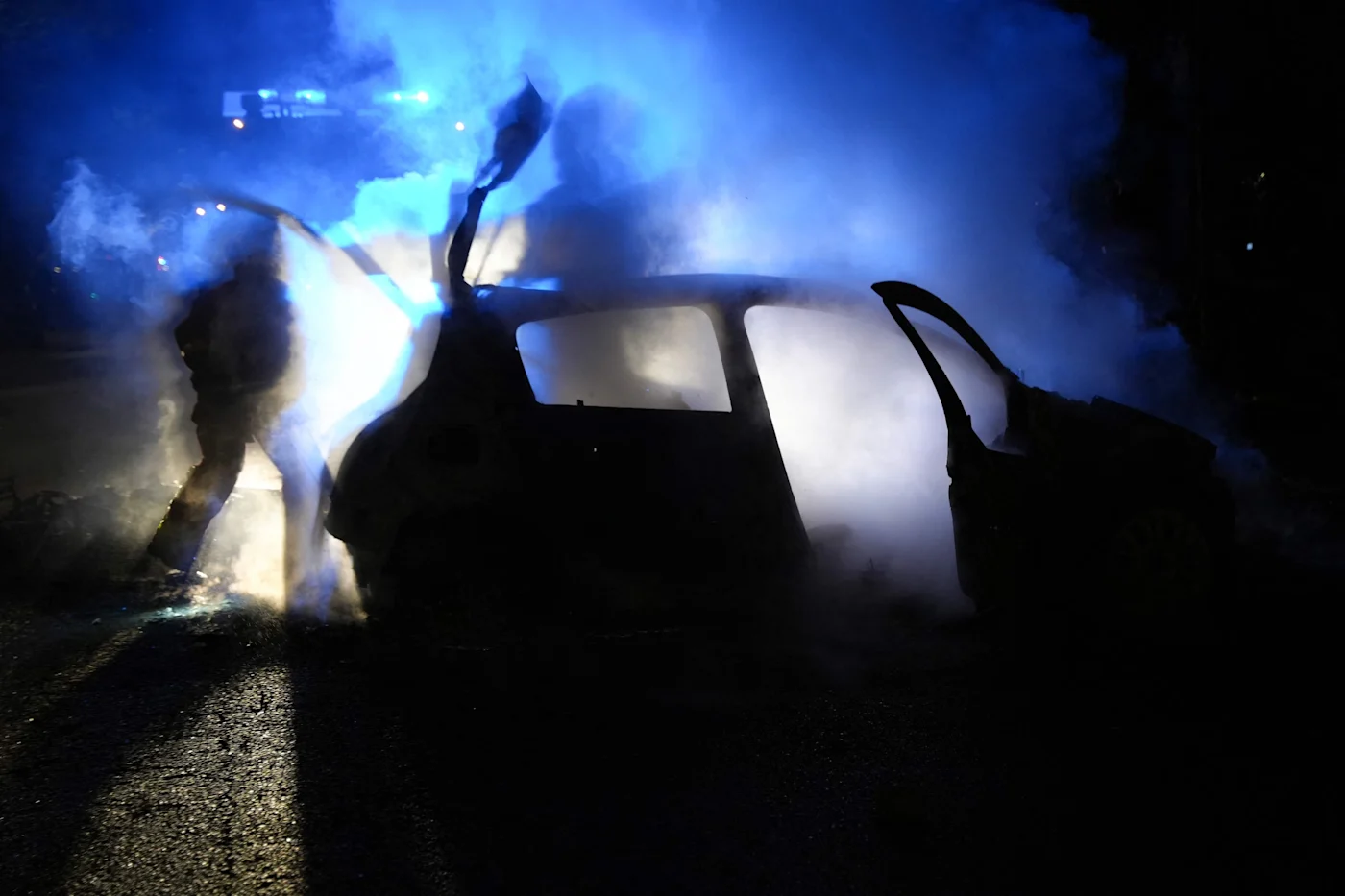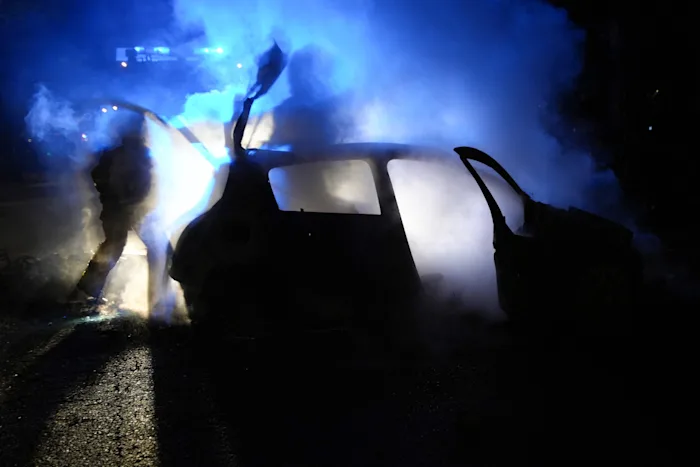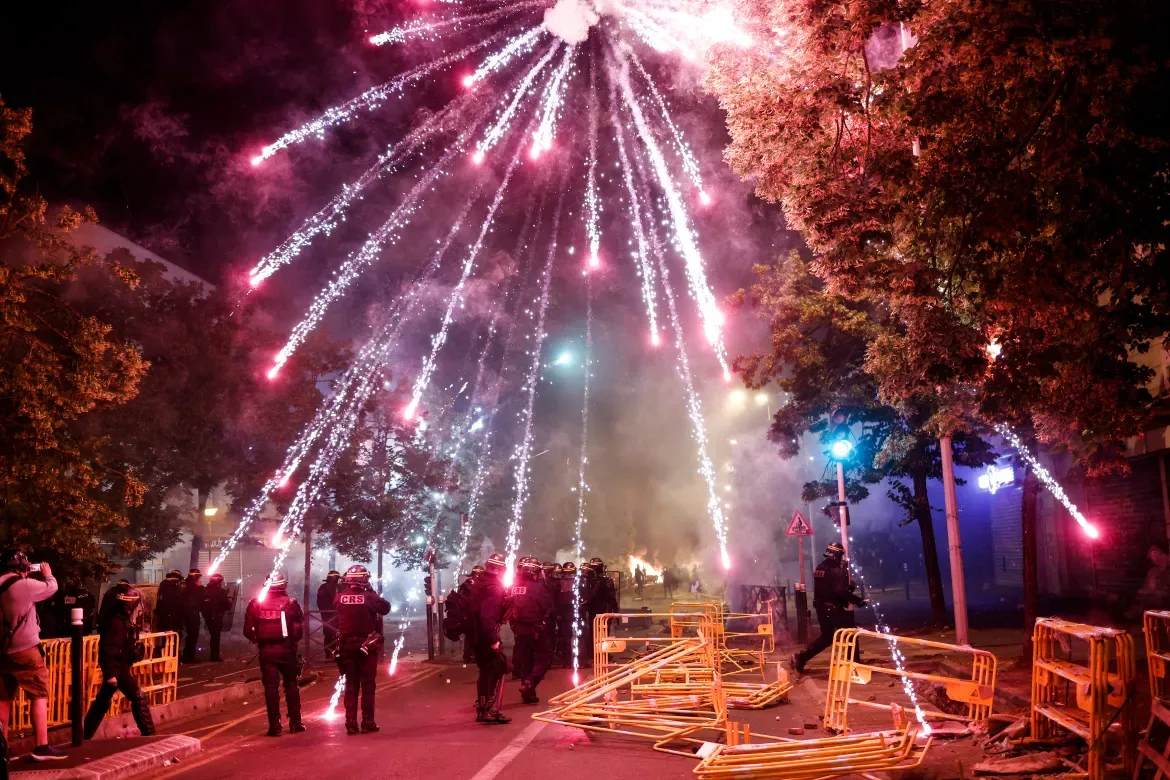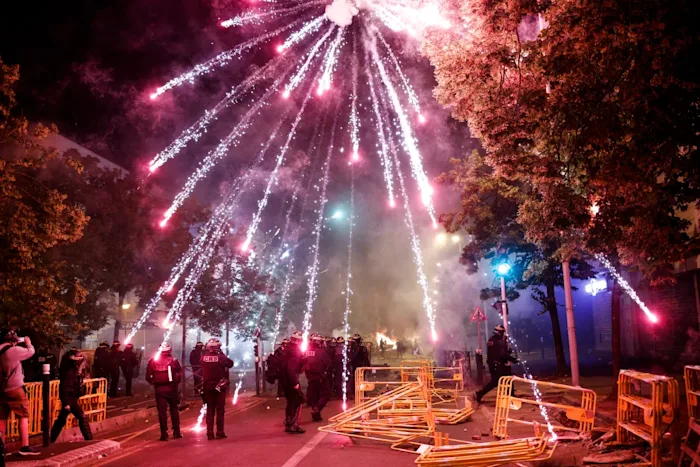Carnivals and Revolt
Josep Rafanell i Orra
Other languages: Español
June 27. Nahel’s murder: yet another young Arab man is executed by the police. It could have been a black man. This time it was caught on film by a resident from a nearby building. The cop who shoots the young man is heard saying: "I'm going to put a bullet in your head!” "Shoot him," the other one says.
We'll find out later that the policeman who murdered Nahel was a former soldier turned peace officer, that he'd been decorated and congratulated on several occasions by Prefect Lallemand, infamous for his sinister “work" during the Yellow Vests uprising. That he had been part of the brutal BRAV-M and CSI-93 units, and the Seine-Saint-Denis "security and intervention company," presently the subject of seventeen investigations for violence and racketeering.
*
A flurry of riots ensued. Across the country, cities with ghettoized neighborhoods reverberate and echo one another. Thousands of cars, buses, and trolleys are burned, 250 police stations went up in flames, including in remote provincial towns. Over a thousand buildings are damaged. 250 bank branches, another 200 shopping centers are destroyed. Towers holding surveillance cameras were sawed clean off. Supermarkets and stores were looted. Kids looting scrupulously, alongside a few mothers here and there.
After remaining confined to the housing estates for the first two days, the riots then spread to the centers of the major cities. Here and there, bands of neo-Nazis are seen arm-in-arm with the police, attacking rioters and handing them over to the police. Two of the main police unions issue a statement demanding that they be allowed to eliminate "pests" arriving from the suburbs. They threaten the government, pledging “resistance” against the savage hordes. “It's war," they exclaim.
There certainly has been a war, these six days: a war waged by the police, the last intermediary body between the state and what the latter declares to be nothing more than rabble. A war that stirs in their minds old images of fascism and ratonnades, albeit under the mantle of a republican start-up.
Following the deployment of the special anti-terrorist corps of the Gendarmerie and the police, the armored cars, the packs of specialized riot police units like the BAC and the BRAV, the riots are put down. The fatigue among the youth also clearly a factor. At least one more is dead in Marseille, a young man in a coma in Lorraine. Nearly 4000 arrests, 400 young people incarcerated by an expeditious justice system. Justice, it's clear, is at the service of the police, as Foucault used to say, and not vice versa. We'll have to wait a minute to discover the full extent of the appalling repression.
*
Macron, Darmanin, and Dupont-Moretti, shocked by images of the efficacy and the intensity of the uprising (even after they deployed an armada of 50000 officers), proceed to lecture the nation’s parents and appeal to their responsibility. They threaten to cut off welfare payments, warn them about the dangers of video games, and so on.
Who are these self-important toadies? The President of the Republic, the Minister of the Interior and the Minister of Justice, respectively. The first is a former investment banker who became president after covering up for a violent thug in the Elysée, who kept a rabid crook on his team of advisors, and turned a repeatedly-convicted former President of the Republic into France's ambassador for major international events. As for Darmanin, under his tenure as mayor of a northern town he was charged with rape for coercing oral sex from a proletarian woman in exchange for a promise of social housing when, an act he readily admits to….but it was a “youthful error,” he tells us. No further action is taken. Dupont-Moretti is still being prosecuted for illegal interest-taking and other offenses, while his son has also been charged with beating up his wife. To make a long story short: some twenty or so members of the government have been and still are the subject of judicial investigations, or even convictions, for corruption and violence, including sexual violence. All this is simply to characterize, in a few strokes, the institutional scenes of power and the clique of degenerates who populate them.
*
On the left, especially on the far left, some anxiously wonder whether these riots and revolts are political. In a learned tone, they seek to reassure themselves that they are: yes, but also no…they're not really political. They are “carnivalesque”...and this, despite the fear of being the next Nahel on the list, despite the rage and pain, the hatred of the State, despite the incandescent disgust for policing and anything that resembles it, including the remnants of pastoral institutions such as schools, community centers, media libraries that only remind them of their social position, the promise of a third-class status in the enchanting world of the economy.


Let there be no misunderstanding: there was a carnival, and at times a quite destructive one, with its own share of nihilism. Should we feel sad when books burn, or Godard's Complete Works on DVD go up in smoke? Should we be on the lookout for the emergence of a new political subject, a product of the colonial histories of the suburbs? In our view, what’s at issue is something else: not a new social subject and its political future, but social hatred that has become a hatred of society, with explosive results.
Around the time of the "yellow vests" uprising, Alain Bertho (an anthropologist who has studied urban riots for decades) looked back upon the 2005 riots:
As to whether these riots were a political, a proto-political, or an apolitical movement…the answer given to me by those who burned cars at the time has remained engraved in my mind: ‘No, it's not political, but we wanted to say something to the state.’ Is there any more clear way to state that, in their eyes, party politics and parliamentarism were useless outlets for saying something to the State?
It's a safe bet that we could find these same words in the mouth of any young person from the riots of 2023.
*
When you see young people (and not-so-young) exiting a looted supermarket with neatly-arranged shopping carts filled with foodstuffs that correspond precisely with the weekly survival of a household: flour, sunflower oil, pasta, a few canned goods, a little meat and fancy sweets, tears come to your eyes. But when we also learn that some kids stole a public transport bus from Marseille in order to drive 800 km. across France to the neighborhood of Stains in Seine-Saint-Denis, as if they were in a road trip movie, we are shaken by irrepressible laughter. The difference is that the carnival today, when it goes out with a bang, is confronted by the over-armed special anti-terrorist units of the RAID and GIGN, i.e., by hooded men in armored vehicles carrying automatic rifles.
*
Graeber and Wengrow tell us: "We cannot understand the realities of power, modern or ancient, without recognizing the gap between what elites claim they can do and what they are actually able to do. [...] The state is 'not the reality which stands behind the mask of political practice. It is itself the mask which prevents our seeing political practice as it is.' If we want to understand it, we must attend to 'the senses in which the state does not exist rather than to those in which it does.'"
*
(A few days before the murder of young Nahel, I met up with a few friends to talk about a "forum" we'd organized on the wasteland reclaimed by collectives at Murs à Pêches in Montreuil, around relationships to urban land and subsistence. It wasn't a great event. On the second day, we were ambushed by "radicals" who sought to force politics into the discussions, sabotaging them with their moralistic injunctions. No big deal: fail, fail again, fail better... Maybe we'll try it again, with a different set-up. And anyway, with the Murs à Pêches association Le Sens de l'humus and a collective, A4 (which investigates and develops possible relationships between exiled migrants and farmers), we've already set up a joint work process to make common use of the plots of land that the former occupies at Murs à Pêches. The collaboration may also lead to setting up more or less clandestine forms of housing.
Back to that rather gloomy encounter. As I made my way home on my motorcycle, I stopped off at a Kabyle bar between Romainville, les Lilas and Bagnolet for a drink. It's a charming locale perched on a corner between two relatively desolate streets. I love these unlikely troquets, their opacity, the way they're tucked away in the city, their way of attracting disparate forms of life. I was greeted by the owner with a big hug, even though we hardly knew each other. He offered me drink after drink. He introduced me to a group of hilarious women in his back kitchen. I could see young Arabs coming in and out, their faces beaming with kindness. There was also a spectral-looking guy with Celtic druid head, long white hair, sixty-something, mute, who was tending to the room, carefully placing spent cups of coffee back behind the counter. I imagine that in a psychiatric day hospital he'd already have a schizophrenic diagnosis slapped on his back: apragmatism, inexpressivity, abulia..., and who knows how many prescriptions for neuroleptics. On my return, after interminable good-byes with the women in the back room, with the boss, his embrace followed by a near-strangulation when he hugged me, I had to take care not to zig-zag too much on the bike if I wanted to get home without crashing...).
*
What happened during the six days of rioting? What we witnessed was the fragmentation of the social. In our exteriority as political radicals, we'll never grasp all the complicities that unfolded, or those that preceded them (one of my friends who tried to join the riots in Belleville was mistaken for an intelligence cop, and had to turn back). It would take years of sympathetic, involved, communal investigation to truly learn anything.
*
A free and communal life, the life of bonds that set us free, has its moments of carnival. Nothing is more terrifyingly insulting to the seriousness of the ecclesiastical powers, yesterday's archbishops and today's social managers, with their afflicted faces (including the faces of leftists), than the blossoming of the anarchic groundlessness of life.
*
To those who want to hand out political blank cheques: there is no longer any basis for dwelling on the representation of social subjects, or their conversion into political subjects through the language of identity. The logic of origins is over. It is useless to chase after causes and consequences that might reveal the meaning of the event. Today more than ever, a revolutionary movement must begin from the middle, in media res.


Was this riotous carnival in the wake of yet another cruel episode of domination a manifestation of politics? Those who seek out a social subject awaiting its politicization miss the point. Not politics and its subjects, but the sudden incarnation of bodies estranged by a metropolis that tries to invisibilize the very thing that holds it together, in its dream of a seamless self-production. A sudden manifestation of presence, under the mask of the rioter: unpredictable, violent, but also humorous. Then comes the vengeance of the police, who, having been outflanked, sense that their pact with the state is in danger of being disavowed. Just as the state, with its arrogant faces, is held together solely by its police, the police cannot exist without the State, which creates a society to be policed. Such is the eternal self-reference of the State.
*
The countless inhabitants of the banlieues will continue to serve as the more or less invisible figures of a city that dreams of itself as transparent, an enchanted, dematerialized, algorithmic spectacle, soulless and fleshless, with no world outside of it. Against its artificial fantasy, we saw the irruption of future workers at logistics warehouses, future supermarket cashiers or delivery drivers, future care assistants at the home where we stash our elderly, those who will one day become the nurses and doctors of our ruined hospitals, or precarious technicians of subcontracted firms in the smooth world of digital technology. Yet we know that this society is already dead, despite all the grimacing faces who claim to govern it, and all those who insist on defending it, armed to the teeth: the Macron, Darmanin, Dupont-Moretti, and their band of enlightened businessmen who can no longer deliver the pastoral contracts they once promised. Life projects projected through the coordinates of capital are finished.
*
We haven't finished with the Great Carnivals to come. After the sound and fury have passed, after the dead have been honored, after the flames and suffering subside, after time knocked off its hinges is once again returned to its dreary linearity, new forms of community will rise from the ashes of the social world. They're already there, blazing new trails. Everywhere, in our here and now, there are elsewheres [des ailleurs].
Everywhere, it's still possible to escape the scenes of representation that enclose us into our identities, thereby readying us to be governed.
To halt its destructive power, it won't be enough to simply change the brutal mask worn by power. It's through the bonds we forge, through the gestures we trace, that we open possibilities for rendering their world of destruction impossible.
—July 9, 2023.